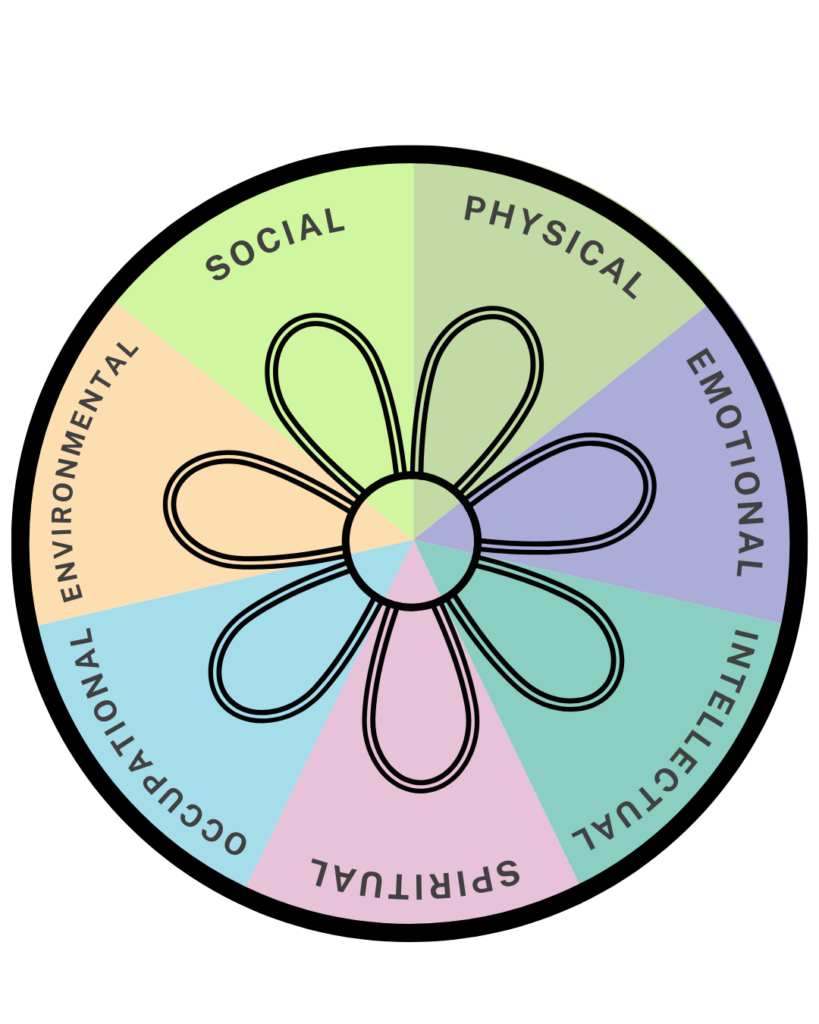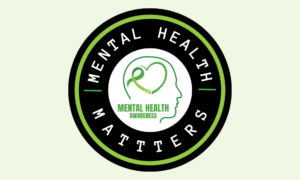Mental Health Awareness Month!
May is dedicated to Mental Health Awareness, with 1 in 6 people facing mental health challenges at work. But what really influences your mental wellbeing? It’s more holistic than you might think.
A common tool for understanding mental health and well-being is the wellness wheel, which names 7 areas of overall well-being: physical, emotional, intellectual, spiritual, occupational, environmental, and social. Surprisingly, neglecting just one area can significantly impact your overall health.

Let’s explore how each aspect of wellness affects you and discover enjoyable ways to care for yourself.
Physical Wellness
Physical Wellness involves understanding your body’s needs for health, healing, and energy. Are you getting enough sleep, eating balanced meals, staying hydrated, and engaging in physical activity regularly?
Being mindful of your physical well-being keeps you feeling vibrant so you can meaningful take on the other 6 elements of the wheel.
Here are some simple ways to prioritize physical wellness:
- Exercise at least 30 minutes a day: It doesn’t have to be intense exercise. Walking, yoga, or doing housework are perfectly reasonable ways to get your body moving.
- Implement a wind-down routine: Train your brain into knowing it’s time to rest. Have a cup of tea, read a book, or journal for 10-20 minutes before hitting your pillow to improve sleep quality.
- Make nutrition fun with colors: It sounds elementary, but eating fruits and vegetables is much more fun when you eat the rainbow. A salad always looks better when it’s colorful and eating fruit in fun shapes and colors makes it interesting and healthy!
Emotional Wellness
Emotional wellness means understanding your feelings, expressing emotions constructively, and managing stress effectively. How you handle emotions impacts other areas of wellness, particularly social connections.
For example, if you have a tough time processing hard emotions you might project those emotions onto one of your friends or family. Another example would be knowing how to set boundaries to avoid burnout and overexertion.
Here’s how to nurture emotional well-being:
- Embrace being alone: Even if you’re the most extroverted person you know, there are many benefits of taking time to yourself. If you are constantly around people, you aren’t allowing yourself to feel and process or recharge your energy levels. Try doing a craft, completing a puzzle, listening to an audiobook, or watching a show.
- Keep a journal or record voice memos: It helps to have all your feelings and emotions on paper or said aloud. Whichever you prefer, practice getting what you feel out of your head, so it feels less overwhelming.
- Go outside: sometimes all you need is to feel a breeze across your skin or the sun on your back to feel better. Whenever you can, find a way to make sure you’re getting enough vitamin D.
Intellectual Wellness
Intellectual wellness involves recognizing your creative abilities and expanding your knowledge and skills. Things like reading, having stimulating conversations, playing brain games, learning about something new, or attending a seminar are great ways to engage your mind.
Your brain might not be a muscle, but it loves a good challenge. Investing in your intellectual abilities can improve cognition, memory, and will help develop your own values and thought structures.
Some ways to expand your creativity and knowledge are:
- Learn a language: Stimulate your brain by learning a new language you can take with you on vacation!
- Do brain games: Completing a crossword puzzle or Sudoku is an effective way to engage you brain.
- Listen to a podcast: Learn something new while you get things done with an educational podcast.
Spiritual Wellness
Spiritual wellness is about connecting with your inner and outer worlds to live by your values and purpose. It doesn’t require religious belief but finding meaning in life through beliefs or practices.
Ways you can connect to your spiritual well-being include:
- Communal religion: If you’re religious, do you have a community to share your values with? Being able to share your religious beliefs with a group of people affirms your sense of belonging.
- Connecting to nature: In nearly all faiths and practices, nature plays a part. Being outside provides perspective and inner peace.
- Reflect by yourself: Developing your sense of self and purpose requires looking inward through journaling, yoga, meditation, mindfulness, or taking a walk.
Occupational Wellness
Occupational wellness involves finding fulfillment in your work or studies. Enjoying your work boosts productivity and overall satisfaction.
It’s a well-known fact that employees who enjoy their jobs are more productive. When you enjoy your job you have more creative ideas, engage with coworkers in meaningful ways, and stay in the position for longer.
Ways to improve occupational wellness:
- Prioritize work-life balance: Overworking yourself is one of the leading causes of burnout. 65% of employees reported they were burnt out in 2023 according to a report done in December of last year. Make sure you’re taking time off and investing in your hobbies, friends, and family.
- Consider flexible work options: Though not an option for everyone, 62% of remote workers felt more productive in a 2022 study and if a hybrid option would help your mental health improve, it might be something to look into.
- Support professional development opportunities: Promoting upskilling is good for both individual and organizational growth.
Environmental Wellness
Environmental wellness acknowledges the interplay between your surroundings, community, and personal well-being. It involves creating safe and comfortable spaces for yourself and others while promoting sustainability.
Some examples of how to increase environmental wellness:
- Create comfortable spaces at home and work: If you work a 9-5 job, you spend 8 hours of your day in an office. Making that space your own is one way that will make it feel more comfortable and homier. Add a lamp, put up some pictures, declutter and organize your things.
- Adopt sustainable habits: Being eco-friendly doesn’t have to be hard. There are very tangible ways that you can make small but impactful changes. Check out our blog on 8 sustainable habits to learn more!
- Foster inclusive environments: Cultivate spaces where people feel free to be themselves without fear.
Social Wellness
Social wellness is about fostering connections, a sense of belonging, and a support system. Building relationships and taking part in communities are essential for mental health. Being alone is extremely important, but having people to talk to when you need it or to just have fun with after work is also necessary.
Try some of these ways to increase your social wellness:
- Join hobby-based communities: Whether it’s sports, crafts, music, or films, there are like-minded people out there who share your interests.
- Adopt a pet: Cats and dogs make great companions and getting to know your pet’s unique behavior is like the process of getting to know a new person!
- Go to the gym with friends/family: Achieve 2 goals with 1 action. Fulfill your social interaction while bettering your physical health.
Remember, each aspect of wellness is interconnected. Taking steps to improve one area can positively impact others. If you think you need to improve your wellness, try one of our suggestions!
Keep up with our other content for Mental Health Awareness Month on our socials!
For more, read about avoiding burnout here!
About LGC
Since 2003 LGC has been building connections between businesses with staffing needs and job seekers looking for new opportunities. Our range of solutions includes temporary and permanent placements (and everything in between) for a variety of industries. With offices located nationwide, we can tap into a dynamic pool of talented professionals. We have a passion for creating partnerships that last and work hard every day to ensure both clients and candidates reach their employment goals.


